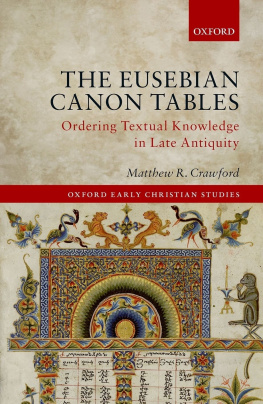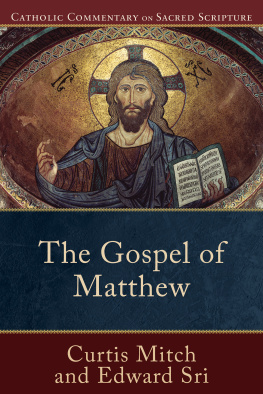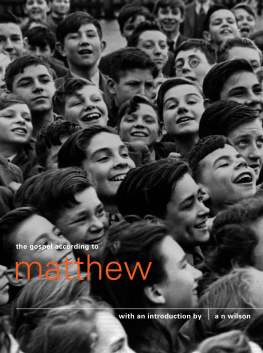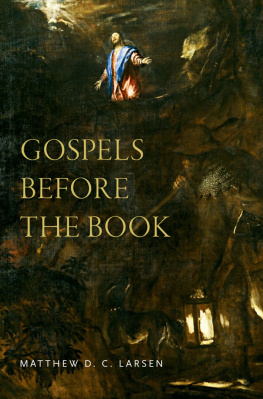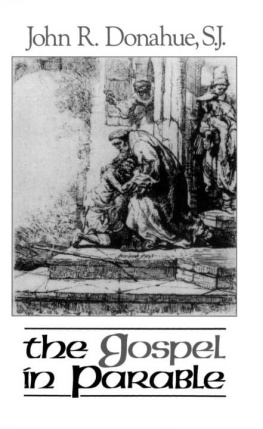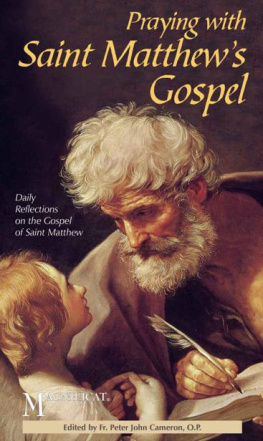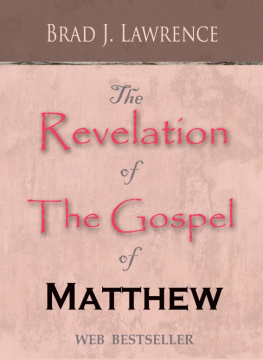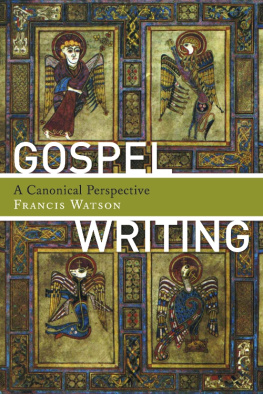Oxford Early Christian Studies
General Editors
Gillian Clark Andrew Louth
THE OXFORD EARLY CHRISTIAN STUDIES series includes scholarly volumes on the thought and history of the early Christian centuries. Covering a wide range of Greek, Latin, and Oriental sources, the books are of interest to theologians, ancient historians, and specialists in the classical and Jewish worlds.
Titles in the series include:
Liturgy and Byzantinization in Jerusalem
Daniel Galadza (2017)
The Roman Martyrs
Introduction, Translations, and Commentary
Michael Lapidge (2017)
Philo of Alexandria and the Construction of Jewishness in Early Christian Writings
Jennifer Otto (2018)
St Theodore the Studites Defence of the Icons
Theology and Philosophy in Ninth-Century Byzantium
Torstein Theodor Tollefsen (2018)
Gregory of Nyssas Doctrinal Works
A Literary Study
Andrew Radde-Gallwitz (2018)
The Donatist Church in an Apocalyptic Age
Jesse A. Hoover (2018)
The Minor Prophets as Christian Scripture in the Commentaries of Theodore of Mopsuestia and Cyril of Alexandria
Hauna T. Ondrey (2018)
Preaching Christology in the Roman Near East
A Study of Jacob of Serugh
Philip Michael Forness (2018)
Augustines Early Thought on the Redemptive Function of Divine Judgment
Bart van Egmond (2018)
God and Christ in Irenaeus
Anthony Briggman (2018)
The Idea Of Nicaea In The Early Church Councils, ad 431451
Mark S. Smith (2018)

Great Clarendon Street, Oxford, OX2 6DP, United Kingdom
Oxford University Press is a department of the University of Oxford. It furthers the Universitys objective of excellence in research, scholarship, and education by publishing worldwide. Oxford is a registered trade mark of Oxford University Press in the UK and in certain other countries
Matthew R. Crawford 2019
The moral rights of the author have been asserted
First Edition published in 2019
Impression: 1
All rights reserved. No part of this publication may be reproduced, stored in a retrieval system, or transmitted, in any form or by any means, without the prior permission in writing of Oxford University Press, or as expressly permitted by law, by licence or under terms agreed with the appropriate reprographics rights organization. Enquiries concerning reproduction outside the scope of the above should be sent to the Rights Department, Oxford University Press, at the address above
You must not circulate this work in any other form and you must impose this same condition on any acquirer
Published in the United States of America by Oxford University Press
198 Madison Avenue, New York, NY 10016, United States of America
British Library Cataloguing in Publication Data
Data available
Library of Congress Control Number: 2018957123
ISBN 9780198802600
ebook ISBN 9780192523587
Printed and bound by CPI Group (UK) Ltd, Croydon, CR0 4YY
Links to third party websites are provided by Oxford in good faith and for information only. Oxford disclaims any responsibility for the materials contained in any third party website referenced in this work.
Acknowledgements
Eusebius was able to create his Canon Tables only because of the prior intellectual labour of Ammonius of Alexandria, and the ingenuity apparent in his creation owes a great deal to the stimulating environment of the Caesarean library. The present project is similarly indebted to a number of scholars who have offered insightful suggestions and criticisms along the way, and was similarly nurtured by two intellectually fertile institutional settings. I began writing this book while employed as a postdoctoral researcher in the Department of Theology and Religion at Durham University and completed it after making a transition to the Institute for Religion and Critical Inquiry at Australian Catholic University. The initial research was supported by a grant from the UK Arts and Humanities Research Council for the project The Fourfold Gospel and its Rivals, whose chief investigator was Francis Watson of Durham. The book owes more to Francis than to any other single person, since he was the one who introduced me to the Canon Tables and convinced me that it was a worthy object of scholarly scrutiny. His influence on my thinking on this matter extends well beyond the citations to his own scholarship in the pages that follow.
The first presentation I gave on the Canon Tables was to the New Testament research seminar at Durham in early 2013, and shortly thereafter the Reverend Canon Rosalind Brown kindly invited me to give a public lecture on the topic to a lunchtime crowd at Durham Cathedral, in connection with the Lindisfarne Gospels exhibit in summer 2013. One of the surprising outcomes of both those events (surprising to me at least) was the degree of interest shown in the topic, an experience that has been replicated many times over in the subsequent four and a half years. In fact, I never would have imagined I would write a book on the Eusebian Canon Tables, but after repeatedly seeing the enthusiasm the material generated among scholarly audiences I finally realized that to do so was imperative. Papers that eventually became chapters were presented at the annual meetings of the North American Patristics Society, the Society of Biblical Literature, the Australasian Association for Byzantine Studies, and the Asia-Pacific Early Christian Studies Society, and I am grateful for the feedback I received on each of those occasions. An earlier version of chapter two was published as an article in New Testament Studies in 2015, and an earlier version of chapter six was published in 2017 in an edited collection entitled Producing Christian Culture: Medieval Exegesis and Its Interpretative Genres, edited by Giles Gasper, Francis Watson, and myself. Alessandro Bausi generously invited me to give a talk on Canon Tables at a conference on multiple-text manuscripts organized by the Centre for the Study of Manuscript Cultures in November 2016, which prodded me to delve into the world of manuscript studies, and he invited me to return in May 2018 for a stimulating conference entirely devoted to Canon Tables. In October 2017 I was able to return to Durham and, thanks to the invitation of Jane Heath, present some of the material in more developed form to the New Testament research seminar, where I was once again reminded that there are few places that are as collegial and intellectually engaging. In addition to these public events, chapters or portions of chapters in various stages were read by Lewis Ayres, Jeremiah Coogan, Ben Edsall, Ja Elsner, Brian Gronewoller, Will Kynes, Margaret Mitchell, Judith McKenzie, Dawn LaValle Norman, Adam Ployd, Robert Thomson, and Jonathan Zecher, all of whom offered comments that have improved the final form of the book.
Other scholars provided assistance in a variety of ways. Stephen Carlson helped me on more than one occasion with conversations about the Synoptic Problem and tracking down and citing Greek manuscripts. Michael Papazian answered multiple queries about Armenian grammar. Andrew Riggsby and Nathan Sidoli shared pre-publication versions of their work which turned out to be crucial for certain stages of the argument, and Peter Williams introduced me to the fascinating Codex Climaci Rescriptus, which I discuss in Appendix . For pressing me to consider the grander implications of the topic and for introducing me to the scholarship of Mary Carruthers (cited in two of the following chapters), I am particularly grateful to T. J. Lang, whom I had the pleasure of having as a colleague during my final year at Durham. The isolated hallway in the top level of the Dun Cow Cottage where we had our offices witnessed many conversations about paratexts, memory, and interpretation, which resulted in a co-authored article and provided the context within which the shape for the present book emerged. Four research assistants have helped in a variety of ways at differing stages of the project: Clift Ward, Carolyn Alsen, Ed Jeremiah, and Jon Simons. I should also thank the Research Office of ACU for providing the funds to cover costs associated with securing copyright permissions and printing the images included in the book, as well as funds for research trips to UCLA in April 2017 and to the British Library in October 2017 during which I was able to examine several Greek, Latin, Syriac, and Armenian gospelbooks related to this project. This financial support came as part of a five-year grant project titled Modes of Knowing and the Ordering of Knowledge in Early Christianity (201721), a fitting theme since the present volume draws attention to one of the most innovative attempts at ordering knowledge in late antiquity.

